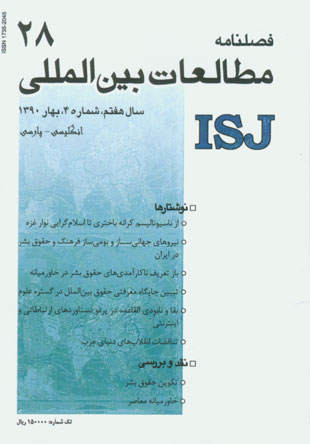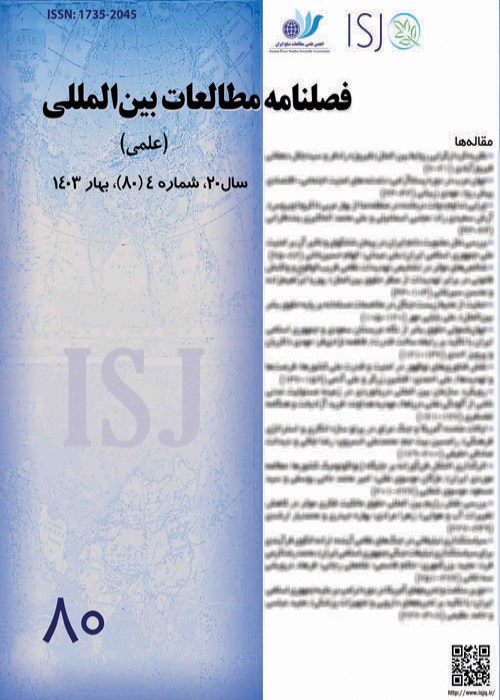فهرست مطالب

نشریه مطالعات بین المللی
سال هفتم شماره 4 (پیاپی 28، بهار 1390)
- 188 صفحه، بهای روی جلد: 15,000ريال
- تاریخ انتشار: 1390/04/12
- تعداد عناوین: 8
-
- نوشتارها
-
صفحه 149
- نقد و بررسی
-
صفحه 157
-
صفحه 164
-
Page 1The confrontation between Hamas and Faith in West Bank and Gaza Strip showcase the long challenges among nationalism and Islamism in Arab world. This confrontation is a symbol of two ideologies which had a concurrence in the history of Middle East. Despite this confrontation in the current days, the Islamist and nationalist forces had a consensus to make a combat against Israel as an occupied country in the beginning of its establishments. Meanwhile the new differences among Palestinian parties are so hard and violent which cannot be solved easily. Of course the idealism of Hamas and popularity of Faith could lead this dual confrontation to this result in which no one can eliminate the other and respecting the democratic values and conciliation with the political realities is the best ways for the two parties.Keywords: Hamas, Faith, Palestine, Confrontation, Middle East, Peace
-
Page 19Iranians’ reactions to globalization have caused a cause of an internal division. While the message of the locals has been that globalization is a modern-day ploy to homogenize the world’s diverse cultures by imposing a near uniformity of values and socioeconomic models on non-Western societies, the cosmopolitans have responded that the globalizing dynamics have heralded an era of change, requiring cultural and religious reformation. It is safe to say that the youth, the women, the intelligentsia, and the media have all advocated reform of the culture. Unlike the shah’s modernization plan, which was imposed from above and lacked domestic constituency, the globalizers’ drive toward social change is largely fueled by grassroots support and an internal reform movement. Today, for instance, some Iranian feminists have even called for adjusting domestic laws to the universal standards embodied in the Convention on the Elimination of All Forms of Discrimination against Women, raising both ethical and legal questions concerning the nation’s all-too-familiar male-dominated gender formula. Moreover, many local and national women’s movements actively support gender equality around the globe, redefining the meanings of identities and interests. Not surprisingly, the locals have capitalized on contradictions inherent in globalization in a country like Iran where religion and highcontext culture continue to play a central role in people’s lives. While human rights are an integral part of the national discourse, fears and uncertainties associated with globalization inexorably generate resistance, keeping localizers’ message alive. As the debate rages on whether to embrace or refute globalization, reformers and their allies represent the best hope for change in the long term.Keywords: Human Rights, Iran, Culture, Globalization, Localization
-
Page 67Recognizing the positive and negative elements of human rights in Middle East could help us promote and protect human rights as well as the rights of individuals in the Middle East. In the Middle East, two powerful institution including state and tradition are the main obstacles toward the ratifications of human rights conventions. The ambiguity of human rights refers to the definition of this expression. The Middle East governments are not interested in making a clear definition of human rights. This ambiguity is one of the reasons the Middle Eastern governments can violate the rights of their peoples. Furthermore, various Middle Eastern academics support the violation of human rights. The issue of proportionality, double personalities and government intervention in university courses and the confirmation of government officials in the meeting with the governors are other main obstacle toward human rights in Middle East.Keywords: State, Tradition, Conventions, Democracy, Human Rights, Middle East
-
Page 89One of the most important epistemological challenges of international law to answer the question: Is international law really a Science? It is an issue that has never been addressed in jurisprudence and has been neglected, in view of the fact that law philosophers efforts have basically been made to prove legal aspects of International Law. Current vacancy has made the writer analyze the theoretical and scientific structures of International Law in light of philosophy of science developments. By describing demarcation standards of science from non science has been referred to logic of causal based. Meaning based and reason based explanations; in so that empirical international law uses the same causal explanation patterns that a science such as physics and analytic methodology is usable in the same proportion that International Law is loyal to experiment. Nevertheless, similarity of explanation patterns and methodology styles shouldn’t be ignored from the epistemological differences of International Law. In addition to causal explanation logic, reason based explanation pattern is needed to justify and obtain optimum understanding of legal phenomena. These different explanation patterns proposes a methodological variety that we don’t suffice verifiable and falsifiable methodologies in the format of unity of methodology, nevertheless methodological pluralistic is a must that progressive and developing science of international law is intensive need of it.Keywords: International Law, Methodology, Epistemology, Reason, Pluralism
-
Page 129The expansion of internet, information and communication provide the possibility of the diffusion of ideologies and knowledge for all international community players around the world. The Al-Ghaedah group had also benefited from this possibility and potential for its terrorist goals and operations. Al-Ghaededh expanded its Satellite and traditional goals by using internet and communication instruments. Satellites news was one of the most important ways for Al-Gahedah to expand its propaganda against western citizens. This article attempt to analyze the influence of internet on the existence and elimination of this terrorist group in the international community. To protect our world from the terrorist attacks it is necessary to protect the internet. We must provide a new convention of the use of internet which clarified the peaceful use of internet.Keywords: Communication, Terrorism, Internet, Ben Ladin, Globalization
-
Page 149Regarding the sabotage of the defeated elites and existing paradoxes in Arab revolution’s concerns are expressed about threat of counter-revolution in Tunisia and Egypt. This article questions how we make sense of the Arab revolution regarding the types of regime political changes? And revolutions are revolutionary enough to offset the perils of restoration? Author believe that Arab revolutions may be characterized neither as revolution per se nor simply reform measures. Instead these are refo-lution that should turning in to revolution (democratic and meaningful changes).Keywords: Revolution, Counter, revolution, Refo, lutions, Reformist change, Insurrectionary model, Regime implosion, Egypt, Tunisia


